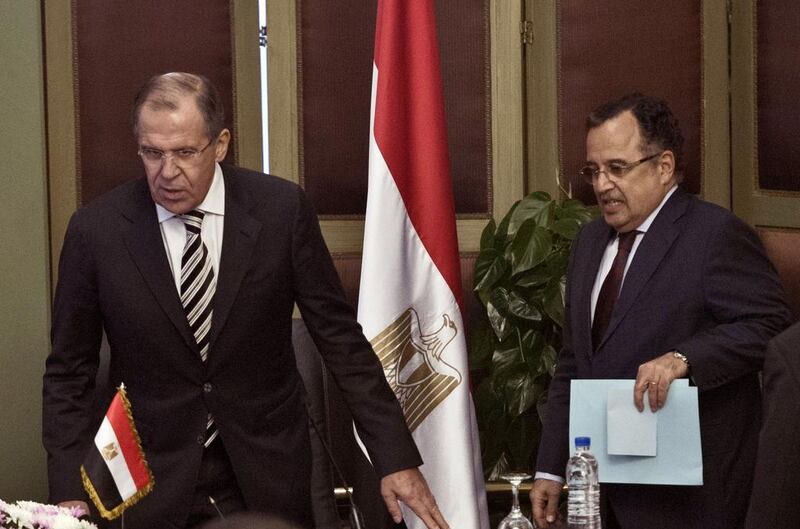It was almost a replay of a 1950s Cold War drama, complete with the same cast: Cairo, Moscow and Washington.
Back then, Egypt wanted a World Bank loan to build the Aswan High Dam. Washington used its influence over that international institution to block the loan, saying the project was not viable.
An indignant Egypt turned to the Soviet Union for help and the Russians swiftly went ahead and helped build the dam and ordered one of its allies, Czechoslovakia, to sell Egypt weapons when no Western nation wanted to do so.
Between the dam and the weapons, Egypt became a Soviet ally for close to 20 years.
Six decades later a strikingly similar scenario is playing out.
The United States in October suspended a large chunk of its annual US$1.3 billion (Dh4.77bn) military aid to Egypt to protest against the army’s removal of the Islamist president Mohammed Morsi.
The suspension, analysts in Cairo and Washington said, was no more than a slap on the wrist.
But the Egyptians were alarmed by the message sent and, frustrated by the perceived bias by Washington in favour of Mr Morsi and his Muslim Brotherhood, decided to teach the Americans a lesson.
Egypt gave a warm welcome to Russia’s foreign and defence ministers when they visited Cairo last month. The two men met the interim president Adly Mansour and the defence minister Gen Abdel Fattah El Sisi, who removed Mr Morsi on July 3 after days of massive protests calling for his resignation.
Sergey Lavrov, Russia’s foreign minister, described the talks in Egypt as “historic”. His Egyptian counterpart, Nabil Fahmy, said the visit amounted to a “re-energisation” of close relations that never stopped.
Days before the visit, a 21-gun salute and a band welcomed a Russian missile cruiser, Varyag, when it docked in Alexandria. Another Russian warship, Boris Butoma, was docked in a Red Sea port for a few days.
Media reports of an impending multibillion dollar arms deal between Egypt and Russia appeared everywhere alongside articles filled with criticism of the United States’ policy on Egypt and support of Israel.
State and private television stations unearthed black-and-white footage from the 1950s and 1960s showing Egypt’s president Gamal Abdel Nasser with Soviet leaders in Cairo and in Moscow.
Commentators and analysts went to great lengths to extol the merits of good relations with Russia as a counter to what they described as Egypt’s dependence on Washington. Thrown in the mix is the widespread perception in the state media of Gen El Sisi as Egypt’s new Nasser.
No arms deals were announced during the visit to Cairo by Mr Lavrov and Sergei Shoigu, the defence minister, with many analysts convinced that any talk of arms purchases was nothing more than a message to the United States that Egypt had options.
However, on November 14, the head of Russia’s state-controlled industrial holding company said Moscow had signed a deal to provide Egypt with an air-defence missile systems.
The deal’s details, including its value, were not released.
A report by the state RIA Novosti news agency said Egypt had also expressed interest in other Russian weapons, including combat planes and helicopters.
The Egyptian government, however, continued to assure everyone in Egypt and abroad that it was not about to replace the United States with Russia as its main foreign backer and source of armament, but that it was trying to stop Hosni Mubarak’s policy of placing all its eggs in a US basket, which has had its downside.
For 30 years, the United States supplied Egypt with weapons that modernised the Egyptian military. But the US has refused to replace Egypt’s F-16s that do not have the same cutting-edge aviation and weapons systems that are available to the Israelis.
The aid programme has strings attached to Egypt’s 1979 peace treaty with Israel, forcing Cairo to toe the line in foreign policy, something that many Egyptians fear went too far and left Cairo without much say to the region.
The Russians may also be seeking something in return for its rekindled love for Egypt besides arms deals. Moscow maintains a base in Syria’s Tartus port on the Mediterranean, but with civil war there in its third year that strategic location is in jeopardy.
Egypt is unlikely to offer Moscow a substitute if Tartus goes, but it may find it beneficial to provide Russian warships port facilities that enable them to sustain their stay away from their home ports.
foreign.desk@thenational.ae





